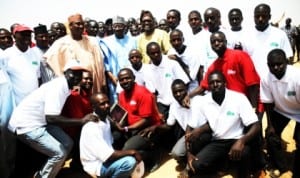Agriculture
RUFIN’s Intervention Lifts 200 Women
The Rural Finance Institu
tion Building (RUFIN) Programme’s intervention has empowered more than 200 women involved in agriculture in Dogonruwa community, Kastina State, in the effort to reduce poverty in the area.
This is contained in a progress report of the programme covering April 2013 to February 2014 and made available to The Tide source, recently.
RUFIN is being implemented in 12 states across the six geopolitical zones (two from each zone) with financial assistance form the International Fund for Agricultural Development (IFAD) a UN agency.
The programme, which is being implemented over a seven-year period, specifically targets marginalised groups such as women, young people and those with physical disabilities.
The objective of this programme is to strengthen microfinance institutions and establish linkages between them and formal financial institutions.
It lays the foundation for the long-term development of a sustainable rural financial system that will eventually operate throughout the country.
By reaching out to poor rural people, the programme ensures that they gain access to financial services and can invest in improving productivity in agriculture and small businesses.
According to the report, the women, who were able to access credit are now farming vegetable, processing and selling groundnut oil and other by products like ‘kulikuli’, with an average capital of N5,000 and monthly profit of N1,000 to N2,000.
The report stated that the women groups started with a loan of N20,000 per member and progressively increased to N80,000 per member currently.
“As a result of access to credit, the women’s capital grew from the average of N5,000 to an average of N160,000 with monthly profit of N13,000 to N18,000,” the report said.
The report noted that the women now own a number of assets which include cows, goats, sheep, furniture and motorcycle.
Others are grinding machine, bags of farms produce – grains, beans, millet, corn, rice etc — which total on the average at N110,000 per person in asset as savings.
According to the report, RUFIN’s intervention in Epe community, Lagos State, a community known for livestock farming and aquaculture, had provided farmers greater access to capital.
It said that access to credit assisted the beneficiaries grow from their initial average capital of between N5,000 and N10,000 to about N120,000 on the average with monthly profit of between N12,000 and N15,000.
Agriculture
FG, Ogun Distribute Inputs To 2,400 Farmers
Federal Government and the Ogun State Government, on Wednesday, distributed farm inputs to farmers as part of effort to address food security challenge.
The State Director, Federal Ministry of Agriculture and Food Security, Dr. Toyin Ayo-Ajayi, during the flag-off ceremony of Inputs Redemption Under The National Agricultural Growth Scheme-Agro Pocket (NAGS-AP), in Ogun State, disclosed that beneficiaries of the gesture were primarily rice, maize and cassava farmers across the State.
Ayo-Ajayi commended the Ogun State Government for partnering with the government at the centre for the effort in supporting farmers with inputs that would bring about yieldings for local consumption and likely exportation.
She noted that government is supporting rice, cassava and maize farmers with inputs worth N212,000; N189,000 and N186,000 respectively.
The Permanent Secretary in the State Ministry of Agriculture, Mrs Kehinde Jokotoye, who represented the Commissioner in the Ministry, Bolu Owotomo, stated that traditional farmers are critical in food production, hence the need to encourage and support them with inputs that would bring about desired results during harvesting.
Owotomo said: “Let us make good use of this opportunity, so that the success of this phase will make farmers benefit more from the state and federal governments of Nigeria.”
Earlier, State Coordinator, Federal Ministry of Agriculture and Food Security, Dr. Oluwatoyin Ayo-Ajayi, appreciated the present administration for partnering with the federal government for the initiative, adding that the programme is designed to support farmers at the grassroots level in cassava, rice and maize with inputs such as, seeds, pesticides, herbicides and fertilizers, to boost their production and enhance their livelihood.
Agriculture
Niger Allocates 10,000 Hectares For Smallholder Farmers
The Niger State Government has mapped out 10,000 hectares of farmland in Gbapo Community of Katcha Local Government Area of the State for smallholder farmers to benefit from the state government’s agricultural intervention programme.
Two thousand out of the 10,000 holders of the farmlands have already received inputs.
At a flag-off ceremony in Yinti Village, the facilitator of the programme, Shinkafan Nupe, Malam Idris Usman Makanta, assured the farmers of increased distributions to the mapped-out ten thousand (10,000) farmlands if farmers respond positively.
He explained that the commencement of the two thousand is to measure the positive response of farmers before obtaining full-scale support.
Malam Makanta stated that this initiative aligns with the farmers’ initial commitment through Niger Foods, whose mission is primarily geared towards establishing efficient and profitable agricultural businesses to support the present administration of Governor Mohammed Umaru Bago’s quest to boost agricultural productivity in the state.
He also commended Niger Foods for their steadfastness and resilience in the effective implementation of the input financing scheme.
Makanta reiterated the commitment of the State Governor in making judicious use of the arable land in the state.
Shinkafan Nupe, therefore, urged the farmers to support the Governor by using the inputs wisely so that the dream can be actualised.
Agriculture
GO-CARES: Gombe Empowers 573,429 Farmers, Entrepreneurs
The Gombe State Government has empowered a total of 573,429 farmers and entrepreneurs under the 4th phase of the GO-CARES programme.
The programme was officially flagged off by Governor Inuwa Yahaya in another major step towards alleviating poverty and supporting the state’s vulnerable populations.
The Governor, while inaugurating the disbursement in Akko Community of Akko Local Government Area, restated his administration’s commitment to the welfare of vulnerable citizens in the state.
He was represented by the Commissioner for Budget and Economic Planning, Salihu Baba Alkali, who is also the Chairman of the Steering Committee on GO- CARES implementation.
“The 4th phase of GO-CARES will directly and indirectly impact a total of 573,429 citizens across the state. Of these, 152,429 individuals will benefit directly through cash transfers, livelihood grants, agricultural inputs, and operational grants to small businesses”, he stated.
The Governor added that, “421,000 people will be indirect beneficiaries through infrastructural projects such as classroom blocks, healthcare facilities, WASH services, and rural infrastructure projects like culverts and drainages”.
Yahaya, reaffirmed his commitment to ensuring that the state’s most vulnerable citizens are not left behind in the state’s development.
According to him, “Earlier this year, on June 25, 2024, we flagged off the distribution of improved seedlings, fertilizers, and herbicides to less privileged farmers in Malam Sidi, Kwami Local Government Area, signaling the commencement of the 4th phase implementation of GO-CARES under Result Area 2”.
The Governor reiterated that these initiatives have had a significant impact on the livelihoods of beneficiaries and the overall agricultural sector.
He explained that, “Today’s ceremony marked the simultaneous launch of activities under all three GO-CARES Result Areas for the 4th phase. These areas include: State Cash Transfer Grants: 2,500 direct beneficiaries; Labour Intensive Public Works: 2,700 direct beneficiaries; Livelihood Grants: 10,000 direct beneficiaries; and Basic Services: 405,000 indirect beneficiaries”.
-

 Oil & Energy4 days ago
Oil & Energy4 days agoOPEC+Commits To Monitoring Oil Production Adjustment
-

 Business3 days ago
Business3 days agoNigeria, Still Africa’s Largest Economy – World Bank
-

 News3 days ago
News3 days agoSoludo Rebagged FG Rice Shared To APGA Members-APC
-

 Sports3 days ago
Sports3 days agoTennis: Alcaraz Celebrates First Indoor Title
-

 News3 days ago
News3 days agoN’Central APC Threatens To Sanction Members Attacking Tinubu
-

 online games2 days ago
online games2 days agoAI-Powered Advanced Leak Detection In Water Risk Management
-

 Opinion3 days ago
Opinion3 days ago2050: Expectations For Poultry Enterprise
-

 Maritime3 days ago
Maritime3 days agoLASWA Deploys Data Management Tech In Water Transport


